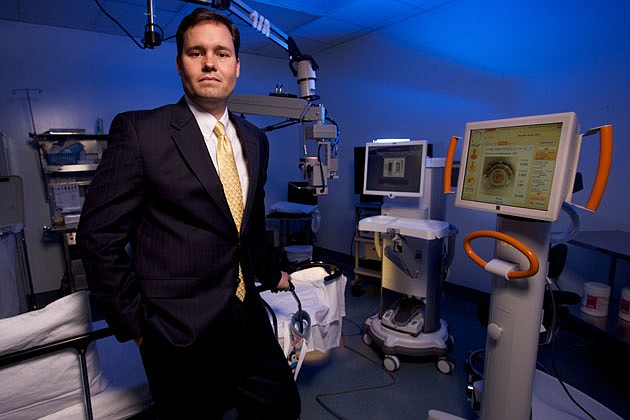- November 24, 2024
-
-
Loading

Loading

These days, being a great eye surgeon doesn't guarantee success.
You've got to be a savvy and disciplined entrepreneur, because government and private insurers aren't going to help you be more successful. As is the case for every doctor, lower reimbursements are on the horizon.
Consider Farrell Tyson, 39, the medical director and owner of Cape Coral Eye Center, an ophthalmic medical practice he took over from his stepfather, Benjamin Martin, after returning from medical school 10 years ago.
To build his practice, Tyson has invested huge sums on new equipment to be more efficient and accurate. He shows off a $37,000 wavefront aberrometer that can scan your eye and detect problems in about a minute, compared with an older system that took 15 minutes with five machines.
Most of the equipment has been financed using cash from operations because Tyson knows how too much debt can sink a practice. “That may mean I don't have the fancy car and big home,” he says.
Tyson's surgery center is highly efficient, too. He performs surgeries on Tuesdays, conducting as many as 40 operations. He alternates between two surgical rooms connected by a clean room. While he operates on one patient, nurses wheel in another one in the adjoining room.
At a time when government and private insurers cut back on payments to doctors, it's that kind of efficiency that will separate successful doctors from the others.
Tyson has shrewdly built the practice to six offices, including a surgery center, in Cape Coral and adjoining North Fort Myers. While most patients come to Tyson by word of mouth, about 18% choose him because of his buildings' locations in high-traffic locations.
Tyson has the eye of a retailer when it comes to picking new locations. “Bank buildings are awesome ophthalmology offices,” he says. “If you're close to the patient, they're not going to travel.”
Cape Coral Eye Center earns additional revenue from clinical trials Tyson agrees to conduct at his clinic. Currently, the center is conducting five studies that will help new techniques and products be approved by the U.S. Food and Drug Administration.
Because elderly patients with vision problems also have auditory challenges, Tyson hired an audiologist. To compensate his full-time professional staff well, about 15% of his employees are bright young high school and college students who get valuable work experience.
Tyson is also exploring another source of revenues: Performing surgeries overseas. Surgeons like him are in great demand abroad and he's exploring the possibility of performing surgery in Dubai four times a year, for example.
Like many entrepreneurial doctors, Tyson is preparing for the point at which a high volume of patients growing at a 15% annual clip won't overcome the ever-falling insurance reimbursements. “You can only see that many patients,” he says.